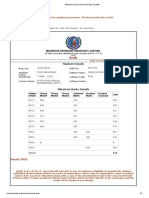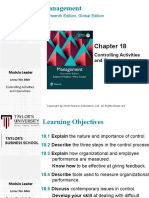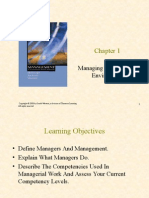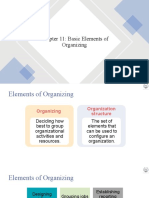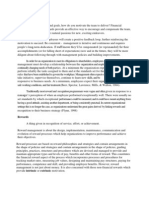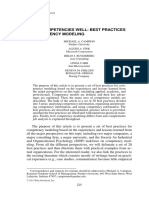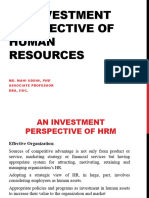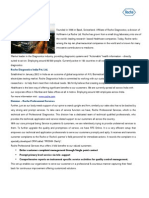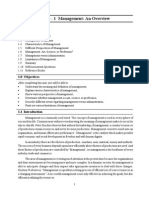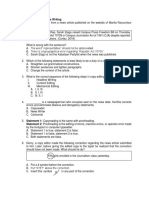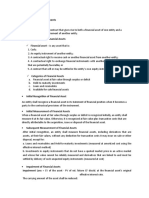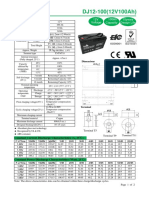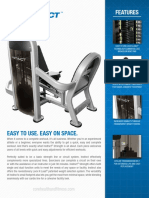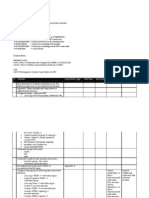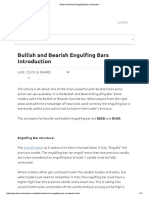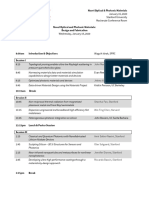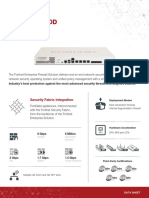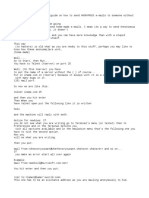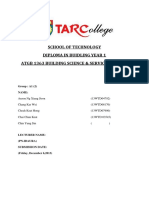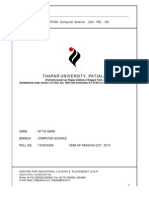The Difference Between Knowledge
Uploaded by
MJThe Difference Between Knowledge
Uploaded by
MJThe Difference Between Knowledge, Skills and Abilities
December 29, 2013 by Sharlyn Lauby
Confession: I have a tendency to use these terms interchangeably at times. Truth is, I shouldnt.
Knowledge, skills, and abilities (aka KSAs) are three different things. And its important to know the
difference even though the difference can be subtle.
knowledge, skills, abilities, skills gap, career, trainingSave
Knowledge is the theoretical or practical understanding of a subject. For example, an employee might
have knowledge of the ADDIE model used in instructional design. This doesnt mean the employee
knows how to be an instructional designer. It means they know the model.
Skills are the proficiencies developed through training or experience. Using the ADDIE example, the
employee has demonstrated skills in applying the ADDIE model when designing training programs. Skills
are usually something that has been learned. So, we can develop our skills through the transfer of
knowledge.
Abilities are the qualities of being able to do something. There is a fine line between skills and abilities.
Most people would say the differentiator is whether the thing in question was learned or innate. I think
of organization and prioritization as abilities that can help an employee develop their instructional
design skills.
The reason we sometimes use the terms interchangeably is because they are all must-haves in our
career. Recruiters look for knowledge, skills, and abilities during the hiring process. Managers use KSAs
when they are considering employees for transfers and promotions. KSAs are used as the company
creates and updates their replacement and succession plans.
As we talk more about the skills gap, it will be important to understand the difference because the way
we obtain knowledge, skills, and abilities can vary. And if were an organization trying to figure out how
to solve the skills gap that exists within our workforce, then we have to link the right solutions.
For instance, if the issue is knowledge, then maybe we can create an in-house library that employees
can check out books on the topics. But if the challenge is skills, the answer might be training. And if
abilities need to be improved, is it possible to develop personal action plans that give employees the
opportunity to refine their abilities.
Thank goodness we have the terminology purists to correct us on the words. There are times when its
fine to use the terms interchangeably and others when we need to emphasize the exact term.
Regardless, theyre all equally important.
You might also like
- A Research About The Production Process and Costing System ofNo ratings yetA Research About The Production Process and Costing System of3 pages
- Result: Maharshi Dayanand University, RohtakNo ratings yetResult: Maharshi Dayanand University, Rohtak1 page
- Lec11 Controlling Activities and Operations Ver2No ratings yetLec11 Controlling Activities and Operations Ver243 pages
- Managing in A Dynamic Environment: All Rights ReservedNo ratings yetManaging in A Dynamic Environment: All Rights Reserved21 pages
- ADS 460 Management Principles and Practices: Topic 1: Introduction To Management100% (1)ADS 460 Management Principles and Practices: Topic 1: Introduction To Management33 pages
- HRM Functions:: What Is Workflow Analysis?No ratings yetHRM Functions:: What Is Workflow Analysis?3 pages
- Prepared by Tallal Basahel: HR Basic: Recruitment and Selection Training and Developments100% (3)Prepared by Tallal Basahel: HR Basic: Recruitment and Selection Training and Developments42 pages
- Chapter 15 Guidelines For Business Practicum100% (1)Chapter 15 Guidelines For Business Practicum44 pages
- Chapter 11: Basic Elements of OrganizingNo ratings yetChapter 11: Basic Elements of Organizing22 pages
- What Is Your View of Employee Discipline and Why Is It Important in The Workplace?No ratings yetWhat Is Your View of Employee Discipline and Why Is It Important in The Workplace?3 pages
- Pay For Performance and Financial Incentives: T TwelveNo ratings yetPay For Performance and Financial Incentives: T Twelve14 pages
- 2 - HRP, Gallagher HR Estimator Nad Cohort Analysis50% (2)2 - HRP, Gallagher HR Estimator Nad Cohort Analysis19 pages
- Doing Competencies Well - Best Practices in Competency Modeling PDFNo ratings yetDoing Competencies Well - Best Practices in Competency Modeling PDF39 pages
- Management Theory Management Is An Art and A Science. Managers Deal With Human Beings WhoseNo ratings yetManagement Theory Management Is An Art and A Science. Managers Deal With Human Beings Whose2 pages
- NMIMS International Finance - Assignment Answers (Sem-IV)No ratings yetNMIMS International Finance - Assignment Answers (Sem-IV)7 pages
- Concept of Decision Making and Nature of OrganizingNo ratings yetConcept of Decision Making and Nature of Organizing19 pages
- Strategic Training: Training Needs in Different Strategies: (See Model On Page 6)100% (1)Strategic Training: Training Needs in Different Strategies: (See Model On Page 6)8 pages
- Impact of Employees Motivation On Organizational EffectivenessNo ratings yetImpact of Employees Motivation On Organizational Effectiveness3 pages
- Differences Between Content and Process Theory100% (2)Differences Between Content and Process Theory2 pages
- Enhancing Your Organization's Learning Culture for Business Results: A Practical Guide For ManagersFrom EverandEnhancing Your Organization's Learning Culture for Business Results: A Practical Guide For ManagersNo ratings yet
- Director Managing Partner Manager Senior Associates: Harer & Jones, Cpas100% (2)Director Managing Partner Manager Senior Associates: Harer & Jones, Cpas6 pages
- Valedictory Address Ronalyn Villaruel Pastrana Class 2014-2015No ratings yetValedictory Address Ronalyn Villaruel Pastrana Class 2014-20153 pages
- Valedictory Address Marc Jul Ferangco Arellano Class 2013-2014100% (1)Valedictory Address Marc Jul Ferangco Arellano Class 2013-20144 pages
- AFFIDAVIT OF PROOF OF OWNERSHIP FOR MTN LINENo ratings yetAFFIDAVIT OF PROOF OF OWNERSHIP FOR MTN LINE2 pages
- Disclosure To Promote The Right To Information: IS 9550 (2001) : Bright Steel Bars (MTD 4: Wrought Steel Products)No ratings yetDisclosure To Promote The Right To Information: IS 9550 (2001) : Bright Steel Bars (MTD 4: Wrought Steel Products)14 pages
- Instance - Checklist For Changing SID and HostnameNo ratings yetInstance - Checklist For Changing SID and Hostname19 pages
- Bullish and Bearish Engulfing Bars IntroductionNo ratings yetBullish and Bearish Engulfing Bars Introduction11 pages
- January 15, 2020 Stanford University Mackenzie Conference RoomNo ratings yetJanuary 15, 2020 Stanford University Mackenzie Conference Room2 pages
- Fortigate 300D: Security Fabric IntegrationNo ratings yetFortigate 300D: Security Fabric Integration4 pages
- Overview of Apa Style: Reynaldo C. Nicdao, PH.DNo ratings yetOverview of Apa Style: Reynaldo C. Nicdao, PH.D54 pages
- Development of The Chinese A2/AD System in The Context of US-China RelationsNo ratings yetDevelopment of The Chinese A2/AD System in The Context of US-China Relations9 pages
- 74AHC1G32 74AHCT1G32: 1. General DescriptionNo ratings yet74AHC1G32 74AHCT1G32: 1. General Description12 pages
- School of Technology Diploma in Buidling Year 1 Atgb 1363 Building Science & Services ReportNo ratings yetSchool of Technology Diploma in Buidling Year 1 Atgb 1363 Building Science & Services Report12 pages
- Brochure Thermomark Roll PHOENIX CONTACTNo ratings yetBrochure Thermomark Roll PHOENIX CONTACT23 pages


